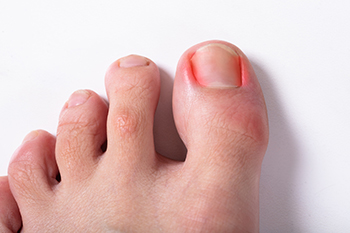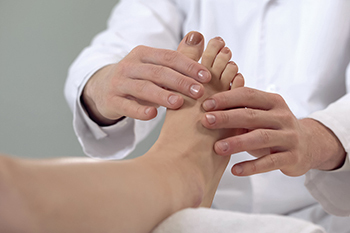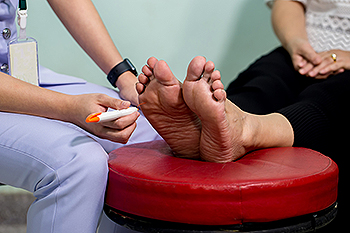Connect With Us
Blog
Items filtered by date: April 2022
Causes of Ingrown Toenails

If you notice that the skin around your toenail has become red, swollen and painful, especially when wearing shoes, you probably have an ingrown toenail. It could become infected if left untreated. The two main causes of ingrown toenails, which typically affect the big toe, are tight shoes and toenails that have been improperly cut. Other causes include stubbing your toe, picking or tearing your toenails or the skin around them, and having sweaty feet. Ingrown toenails are more common in older people, because the nails become thicker with age. The best way to avoid an ingrown toenail is to trim the nails straight across and not too short; wear shoes that fit well; and keep your feet clean and dry. If you have continual problems with ingrown toenails, or have developed an infection, it is a good idea to see a podiatrist as soon as possible. Ingrown toenails are more likely to develop in people who have diabetes and circulation problems. If you have either of these conditions, it is wise to visit a podiatrist regularly for treatment.
Ingrown toenails can become painful if they are not treated properly. For more information about ingrown toenails, contact Dr. Eddy Caldwell of Foot Care of Northeast Arkansas, P.A.. Our doctor can provide the care you need to keep you pain-free and on your feet.
Ingrown Toenails
Ingrown toenails occur when a toenail grows sideways into the bed of the nail, causing pain, swelling, and possibly infection.
Causes
- Bacterial infections
- Improper nail cutting such as cutting it too short or not straight across
- Trauma to the toe, such as stubbing, which causes the nail to grow back irregularly
- Ill-fitting shoes that bunch the toes too close together
- Genetic predisposition
Prevention
Because ingrown toenails are not something found outside of shoe-wearing cultures, going barefoot as often as possible will decrease the likeliness of developing ingrown toenails. Wearing proper fitting shoes and using proper cutting techniques will also help decrease your risk of developing ingrown toenails.
Treatment
Ingrown toenails are a very treatable foot condition. In minor cases, soaking the affected area in salt or antibacterial soaps will not only help with the ingrown nail itself, but also help prevent any infections from occurring. In more severe cases, surgery is an option. In either case, speaking to your podiatrist about this condition will help you get a better understanding of specific treatment options that are right for you.
If you have any questions please feel free to contact our office located in Jonesboro, AR . We offer the newest diagnostic and treatment technologies for all your foot and ankle needs.
The Dangers of Gangrene
Several chronic diseases that affect the feet – such as diabetes, peripheral artery disease (PAD), and Raynaud’s disease – can lead to a severe deterioration of the tissues that causes gangrene. When blood circulation to an area of the body, such as the feet or legs, is blocked, the tissue breaks down and eventually dies. Symptoms include coldness and numbness; pain, redness, and swelling; a foul odor emanating from the affected area; and discoloration of the skin. If left untreated, gangrene may lead to amputation and can sometimes be fatal. Treatments include antibiotics, removal of dead tissue, hyperbaric oxygen therapy, and removal of the blocked artery, depending on age, physical condition, and severity of the case. If you have any of the conditions listed above, and especially if you are experiencing these symptoms, it is strongly suggested that you consult a podiatrist as quickly as possible for an examination, diagnosis, and treatment plan.
When dealing with systemic disease of the feet, it is extremely important to check the affected areas routinely so that any additional problems are caught quickly. If you have any concerns about your feet and ankles contact Dr. Eddy Caldwell from Foot Care of Northeast Arkansas, P.A.. Our doctor will assist you with all of your podiatric needs.
Systemic Diseases of the Feet
Systemic diseases affect the whole body, and symptoms usually are displayed in the feet. This condition can make a patient’s ability to walk unbearable. Systemic diseases include gout, diabetes mellitus, neurological disorders, and arthritis.
Gout – is caused by an excess of uric acid in the body. Common symptoms include pain, inflammation, and redness at the metatarsal/phalangeal joint of the base big toe. Gout can be treated by NSAIDs to relieve pain and inflammation, and other drugs that lower the acid levels in the body.
Diabetes mellitus – is an increase in the level of blood sugar that the body cannot counteract with its own insulin. Failure to produce enough insulin is a factor in Diabetes.
Diabetes of the Feet
Diabetic Neuropathy – may lead to damaged nerves and affect the feet through numbness and loss of sensation.
Peripheral Vascular Disease – can restrict the blood flow to the feet, and often times lead to amputation of the feet.
If you have any questions please feel free to contact our office located in Jonesboro, AR . We offer the newest diagnostic and treatment technologies for all your foot and ankle needs.
Get Professional Care for a Broken Foot or Ankle
Three Foot Shapes
 The bones in babies feet are made of flexible and soft cartilage. As the child grows, the bones harden and provide the ability to walk and run. Most children are born with flat feet, and the arch generally develops in the teenage years. Research has indicated there are three foot shapes that are inherited. When the big toe is the biggest toe, this is referred to as a tapered shape. A rounded shape is noticeable when the second or third toe is longer than the big toe. A square shape is defined as all the toes appearing to be the same length. It is beneficial to have your child walk barefoot while indoors, as this can be helpful in strengthening the overall foot. Additionally, tickling can enable the child to point and flex the feet. If you would like more information about how to care for your child’s feet, please speak with a podiatrist.
The bones in babies feet are made of flexible and soft cartilage. As the child grows, the bones harden and provide the ability to walk and run. Most children are born with flat feet, and the arch generally develops in the teenage years. Research has indicated there are three foot shapes that are inherited. When the big toe is the biggest toe, this is referred to as a tapered shape. A rounded shape is noticeable when the second or third toe is longer than the big toe. A square shape is defined as all the toes appearing to be the same length. It is beneficial to have your child walk barefoot while indoors, as this can be helpful in strengthening the overall foot. Additionally, tickling can enable the child to point and flex the feet. If you would like more information about how to care for your child’s feet, please speak with a podiatrist.
Making sure that your children maintain good foot health is very important as they grow. If you have any questions, contact Dr. Eddy Caldwell of Foot Care of Northeast Arkansas, P.A.. Our doctor can provide the care you need to keep you pain-free and on your feet.
Keeping Children's Feet Healthy
Having healthy feet during childhood can help prevent medical problems later in life, namely in the back and legs. As children grow, their feet require different types of care. Here are some things to consider...
Although babies do not walk yet, it is still very important to take care of their feet.
Avoid putting tight shoes or socks on his or her feet.
Allow the baby to stretch and kick his or her feet to feel comfortable.
As a toddler, kids are now on the move and begin to develop differently. At this age, toddlers are getting a feel for walking, so don’t be alarmed if your toddler is unsteady or ‘walks funny’.
As your child gets older, it is important to teach them how to take care of their feet.
Show them proper hygiene to prevent infections such as fungus.
Be watchful for any pain or injury.
Have all injuries checked by a doctor as soon as possible.
Comfortable, protective shoes should always be worn, especially at play.
If you have any questions please feel free to contact our office located in Jonesboro, AR . We offer the newest diagnostic and treatment technologies for all your foot and ankle needs.
How to Handle Swollen Feet and Ankles
Swelling in the extremities, such as the lower legs, ankles and feet, is called peripheral edema. This buildup of fluids becomes more common as you get older, partially because of gravity, but also from reduced circulation or a more sedentary lifestyle. It also may be the result of standing or walking for long periods of time, or being overweight. Further, certain medications, such as anti inflammatories, antidepressants, and steroids, may cause water retention. Sometimes, just by keeping your legs elevated when lying down, increasing exercise and other activity, losing weight and reducing salt intake, the swelling can be reduced. However, edema may also be a signal of other, more serious conditions, including blood clots, injury, or infection. If swelling in the feet and ankles continues or worsens, it is a good idea to make an appointment with a podiatrist who can properly diagnose the problem and suggest treatment options.

Everyday foot care is very important to prevent infection and other foot ailments. If you need your feet checked, contact Dr. Eddy Caldwell from Foot Care of Northeast Arkansas, P.A.. Our doctor can provide the care you need to keep you pain-free and on your feet.
Everyday Foot Care
Often, people take care of their bodies, face and hair more so than they do for their feet. But the feet are a very important aspect of our bodies, and one that we should pay more attention to. Without our feet, we would not be able to perform most daily tasks.
It is best to check your feet regularly to make sure there are no new bruises or cuts that you may not have noticed before. For dry feet, moisturizer can easily be a remedy and can be applied as often as necessary to the affected areas. Wearing shoes that fit well can also help you maintain good foot health, as well as making it easier to walk and do daily activities without the stress or pain of ill-fitting shoes, high heels, or even flip flops. Wearing clean socks with closed shoes is important to ensure that sweat and bacteria do not accumulate within the shoe. Clean socks help to prevent Athlete’s foot, fungi problems, bad odors, and can absorb sweat.
If you have any questions please feel free to contact our office located in Jonesboro, AR . We offer the newest diagnostic and treatment technologies for all your foot and ankle needs.







